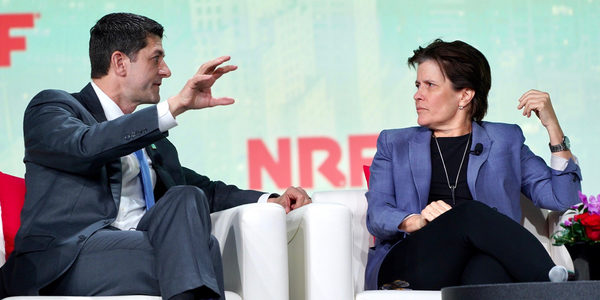"Calmer waters" in trade wars could boost economy in 2020, Paul Ryan says

Healthy consumer consumption rates and strong wage growth will drive an improved economy in 2020 as the White House eases off its latest tariff threats and lawmakers appear to reach agreement on approving the United States-Mexico-Canada Agreement (USMCA) on North American trade, Paul Ryan—the former Speaker of the U.S. House of Representatives—said today.
Speaking in a keynote address at the National Retail Federation (NRF)'s "Big Show" in New York, Ryan acknowledged that the Trump Administration's volatile series of tariff threats and policies had created an unpredictable business environment and cramped economic progress as measured by the gross domestic product (GDP), but said those conditions would ease in the new year. "We will have calmer waters on trade in 2020 that will take away the drag we've had on GDP growth," Ryan predicted during the session, which was titled "2020 perspectives: Retail on the global socio-economic stage."
Coming during an election year, Ryan's comments were not surprising, since they aligned with his former political position as the Republican House Speaker from 2015-2019, including President Trump's first two years in office. Ryan has since taken jobs in the private sector, joining the board of directors of broadcaster Fox Corp. and the faculty of the University of Notre Dame.
However, his position also echoed a similar report from the NRF itself, which has been opposed to Trump's tariffs despite supporting the administrations overall efforts to forge a more equal playing field for international trade with China. Last week, the NRF and consulting firm Hackett Assocs. predicted that maritime container trade volumes would return to usual seasonal patterns during the first few months of 2020, following a year of fluctuations and uncertainty.
Despite those sunny short-term forecasts, the U.S. economy faces a more complicated path forward for sustained, long-term development, according to another speaker on the panel, Kara Swisher, the former Wall Street Journal columnist who is now co-founder and editor-at-large of the online magazine Recode.
Specifically, American startup firms are often blocked from success because the economy is dominated by near-monopolies in fields such as the airplane, finance, and technology sectors, she said. Unless government regulators are able to give small firms enough space to compete, the U.S. will fall behind in the pending international rush toward a "new industrial revolution" in artificial intelligence (AI), robotics, automation, fifth generation (5G) networks, and facial recognition, she said.
In fact, China has already launched massive, government-funded initiatives in many of those areas that could be hard for the U.S. to match on a dollar-for-dollar basis, Ryan agreed. "We will not win a race with China if it's all about investment; they will outspend us. The question is if we can make it about free markets and incentives," Ryan said.
In the rush toward a new stage of technology development, the U.S. will need to counteract the effect of a massive wave of retirement in the Baby Boomer generation by providing increased opportunities to educate the American workforce, both speakers said. Ryan suggested those opportunities could come through greater access to two-year associates degrees, while Swisher targeted support for small entrepreneurs and immigration reform.
Related Articles

Copyright ©2024. All Rights ReservedDesign, CMS, Hosting & Web Development :: ePublishing